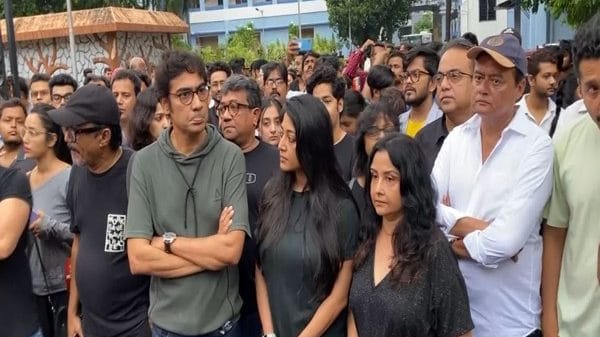Parambrata Chattopadhyay’s Bengali movie Ei Raat Tomar Amar was set to reunite actors Anjan Dutt and Aparna Sen on the big screen. Everything was ready for the 30 August release. Then, it was postponed indefinitely.
The rape and murder of an on-duty junior doctor at Kolkata’s RG Kar Medical College and Hospital on 9 August, along with the widespread protests that followed, has brought the Bengali film industry to a grinding halt. Actors, producers, directors, camerapersons, and technicians have joined the protests in large numbers.
“In the middle of such a movement by people protesting the incident, we cannot be thinking only about our commercial interests,” said producer Rana Sarkar, whose film Onko Ki Kothin has also had its release put on hold. “I don’t think people are even thinking of Pujo, watching movies, or enjoying anything at the moment.”
This is the latest hiccup in Bengali film industry, which has been reeling under one crisis after another. It began with a strike by technicians in July, was followed by a political crisis in Bangladesh, and now the rape-murder of the junior doctor.
Apart from Ei Raat Tomar Ama, other Bengali films have also pushed their release dates indefinitely. These include Ron Raj’s Porichoy Gupta, Saurav Palodhi’s Onko Ki Kothin, and Krishnendu Chatterjee’s Jomaloye Jibonto Bhanu. All were scheduled for release in the last week of August and the first week of September. The release of Jomaloye Jibonto Bhanu—a tribute to actor Bhahndu Upadhaya—has been rescheduled to 22 November, following the cancellation of its special screening on 26 August.
“We are all appalled at what has happened in our city, which is otherwise considered one of the safer places in the country. Irrespective of political beliefs, normal people have asked for accountability from the administration, and that’s the right thing to do,” said Parambrata Chattopadhyay. The title of his film, inspired by the famous song ‘Ei raat tomar amar’, sung by the legendary Bengali singer and composer for Dweep Jwele Jai (1959), had already stirred interest with its poster.
“In this atmosphere, we didn’t find it to be the right time for any celebratory event. Hence, we have decided to postpone the release, as many others have done,” he added.
Joining the cause
The Bengali film industry has never been one to stand on the sidelines of issues affecting the state.
“It has always been politically aligned and vocal about issues. Even though many associated with the industry may be left-leaning, it is not a surprise that they have joined the protests actively. If they hadn’t, that would have been a surprise,” said Madhuja Mukherjee, screenwriter and professor in the Department of Film Studies at Jadavpur University.
Political alliances have not muted resistance.
Despite the turmoil, shoots for television content, which is broadcast daily, are continuing as scheduled.
Many in the film industry have shown solidarity by participating in protests, marches, rallies, and demonstrations, which are gaining momentum. Actor and former Trinamool Congress MP Mimi Chakraborty voiced her support for the RG Kar victim on Instagram and took to the streets to demand accountability. Actor and TMC MLA Raj Chakraborty, along with his wife and actress Subhashree, joined a 200-member rally organised by Bengali film industry actors. Other prominent figures like Srijit Mukherjee, Kaushik Sen, Saswata Chatterjee, Paoli Dam, and Churni Ganguly also lent their presence to the cause.
It’s almost as if everyone took a page from Uttam Kumar’s Nayak: The Hero (1966), in which an actor regrets not participating in a protest.
“They would also be under pressure because the movement has been spearheaded by women’s organisations and common people,” Mukerjee added.
‘Justice is important’
The Independence Day weekend saw the release of several movies across various languages and industries. In Bengal, two films were released: Padatik, a biopic on filmmaker Mrinal Sen, and Babli, a romantic film. However, in the immediate aftermath of the RG Kar incident, there were minimal promotions for these movies, and the shows saw limited viewership. The streets of West Bengal were filled that night as women’s organisations called for ‘Reclaim the Night’ marches.
Others are active on Instagram, X, and Facebook, reminding their followers that justice must be served first. Actor Abir Chatterjee, on 15 August, shared an Instagram post announcing that the makers and cast of the movie Babli had decided to halt all promotions for the film.
“We feel currently it is our responsibility to pause any celebratory event and that is why we have decided to call off the film’s special screening, which was scheduled for tomorrow, 16 August,” the post stated.
In a previous post, Chatterjee had shared his thoughts on the widespread protests across the state and country, and offered condolences to the doctor’s family. “The questions that are being raised should not lose their proper directions,” he wrote.
Abir’s film Babli managed to earn Rs 18 lakh in its first week, while Padatik made Rs 6 lakh. The recent protests in Bangladesh prevented Padatik’s lead actor, Chanchal Chowdhury, from traveling to India, which limited the film’s promotional efforts.
Female artists are also advocating for safer working conditions in the industry. Over 100 female artists from the Bengali film industry, including Aparna Sen, Swastika Mukherjee, and Paoli Dam, have jointly written a letter to the West Bengal Tele Academy demanding a safer work environment. The letter highlights the lack of functional support systems to prevent and address sexual harassment and the ongoing silence regarding recurring incidents of abuse in their workplaces.
Producers are also willing to change their marketing strategies. For instance, Sarkar plans to focus on film festivals in November and December.
“Even if the theatre release is six months later, it does not matter. Justice is important,” he said.






